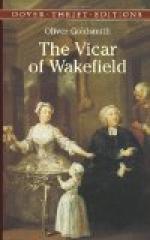|
This section contains 3,868 words (approx. 13 pages at 300 words per page) |

|
SOURCE: "From Patrimony to Paternity in The Vicar of Wakefield" in Eighteenth-Century Fiction, Vol. 9, No. 3, April, 1997, pp. 327-36.
In the following essay, Murray contends that ultimately The Vicar of Wakefield concerns the nature of authority and transformation.
In his Advertisement to The Vicar of Wakefield, Oliver Goldsmith declared that his hero, the Reverend Dr Primrose, "unites in himself the three greatest characters upon earth; he is a priest, an husbandman, and the father of a family."1 He is also the narrator of a story, and in all four of these positions of authority, Primrose is quixotically ineffective. As a priest he pursues his "peculiar tenet" (p. 13) of strict monogamy to the point of alienating parishioners, even before the initial loss of fortune that precipitates the novel's action. As a husbandman he proves to be comically inept in managing his resources. Throughout the first half of the novel he...
|
This section contains 3,868 words (approx. 13 pages at 300 words per page) |

|


